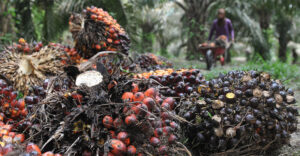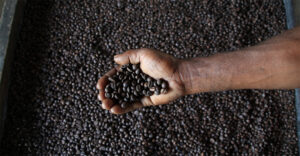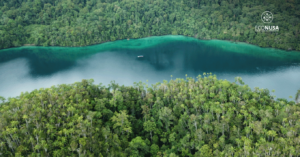
Halmahera Island is envisaged from the ship taking us from Kofiau Island in Raja Ampat. The southern tip of Halmahera Island is one of spots Alfred Russel Wallace once paid a visit. He is the British explorer who collected samples of flora and fauna for scientific studies. The island is deemed an important spot for some biological discoveries at the time.
Some far-off villages were caught by our sight. Worship edifice looked prominent from a distance. Coconut trees stretched along as seen from the ship. For hundred years, coconut is the main source of the locals livelihood at the coastal lines of Halmahera Island and some parts of Papua Island. These coconuts are processed into copra before shipping. Unfortunately, copra price has not been as lucrative as the charm of coconut tree. Copra cost even drops under one thousand rupiah per kilogram. As a result, coconut trees grow wild on the dwellers areas.
When I was imagining how Wallace came into these regions at the time, a tugboat moved across our ship. The tugboat tugged a large barge. Despite the empty barge, it existence signifies an event of massive exploitation and extraction in Halmahera Island. Directing from the barge’s whereabout, it was possibly heading off Widi. There is a mining for nickel and gold from Halmahera earth. The island is rich with minerals. It might be said that the islands stretching from Raja Ampat up through to Soroako in Sulawesi are nickel-resources islets. Nearly all of the islets have been plotted as mining spots.
We were closing to the second destination village, Gane Dalam. From a distance, it portrayed hilly areas that have been shaved with cleared forests. Most of them have been replaced by a four-year-old palm oil. There was a large edifice standing on the coastal areas with large pathway ascending to the plantation area. Palm oil estate here is under PT Korindo operation.
Seeing the fact gave a heartbreaking feeling. The regions are one of the biodiversity hotspots that once were visited by Alfred Russel Wallace to collect specimens of Halmahera’s biodiversity.
We anchored at a bay that was formerly used as the Indonesian military base to free Irian Barat. A local resident told that the bay was once full of warships. The warships at the time forced the villagers head for the forest.
Our ship stopped nearby Gane Dalam Village. Formerly, local people called Gane Dalam a Gani Country. At that small port of Gane Dalam, elderly figures and colleague from WALHI North Maluku welcome us. Cakalele dance performance marked the warm welcome of Gane Dalam villagers to our visit. We then had lunch with the locals and colleague from WALHI. Here we could observe the original commodity such as salted fish, coconut oil, handicraft and banana crisp.
Gane Dalam is deemed a “opposition village” mobilized by WALHI North Maluku since 2010. The villagers opposed against unjust rights and environment that has been safeguarded for hundred years. It has been for years the timbers from their forests were exploited by company. Since 2010, PT Korindo cleared the forests of which Gane Dalam community depend their lives for years and converted them into palm oil estate.
As from a total of 11,000 hectares, 7,000 hectares have been cleared and converted into palm oil plantation. PT Korindo did not only damage environment of Gane’s forest and land but also the customary land and forests in the southern of Tanah Papua.
In 2013, dozens of Gane villagers were imprisoned due to their alleged interfering activities against the company. The community protested PT Korindo for destroying land and forest in which the locals source their livelihood and for ignoring the locals’ rights.
The presence of PT Korindo also wiped out the community’s social norm. I once asked a villager on whether there are two mosques in the small village. They said that when some villagers were released from court, they raised fund to build a new mosque.
The villagers were then set apart among the pros and against PT Korindo. Even they keep apart when deals with religious issue. With the existence of PT Korindo, it tainted the local brotherhood bonds. Even siblings are segregated due to the existence of the company.
The 2019 earthquake collapsing masses of houses have made them realize that none could they rely on but their only brotherhood. The earthquake in fact has united the local bonds despite the existing PT Korindo. They never step back to fight against the company.
Our visit to Gane Dalam was intended to provide backup to the community. Medical volunteers from EcoNusa Team and the local health workers campaigned the prevention of Covid-19 and free medical check. We also distributed farming equipment to create local food resilience.

Young people in Gane Dalam are full of spirit generations. However, deep down in their heart, there is lingering apprehensive future noting the fact that their forests have been cleared away. With WALHI, we also planted mangrove surrounding the village. Mangrove will expectedly give a light of hope following the clean-shaven deforestation.
Bustar Maitar
CEO EcoNusa & Tim Leader Ekspedisi Maluku EcoNusa
Editor: Leo Wahyudi




